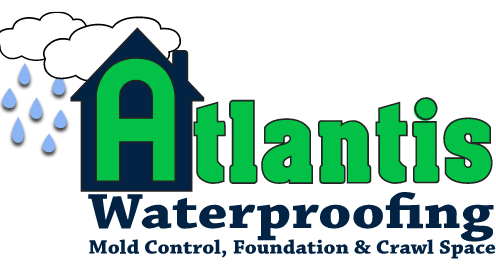Frequently Asked Questions about Waterproofing and Foundation Issues
Atlantis Waterproofing & Mold Control provides all of our basement waterproofing, foundation repair, crawl space repair, and mold removal services to the Tennessee area. If you have any questions, give us a call today and we will be happy to help you!
Basement Waterproofing Common Questions
-
What does a wet basement mean?
A wet basement means you have some type of leak allowing water into your basement. This is usually caused by what is known as hydrostatic pressure, which is basically water pushing against your foundation walls from the outside. If you have any kind of water in the basement, whether during heavy storms or when snow is melting, it could be a sign of a larger problem.
-
How do you fix a wet basement?
The best way to fix a wet basement is not always simple to determine. Depending on the cause of the wet basement, there are a number of different repair solutions. This is why any wet basement problems should be inspected by a trained professional who can properly evaluate the problem.
-
Can water come up through concrete basement floors?
Yes, water can come up through concrete basement floors both through floor drains or at the cove joint which is where the wall and floor meet.
-
What is the best way to waterproof a basement?
The best way to waterproof a basement is through the use of an interior waterproofing system. These systems are designed to collect, store, and divert water that is entering a basement to a sump pit and then remove the water with a sump pump.
-
What is average cost to waterproof a basement?
The average cost to waterproof a basement will vary depending on the severity of the basement water problem, which is why it is important to have a professional inspect the problem and provide an estimate.
Foundation Settlement Common Questions
-
What is foundation settlement?
Foundation settlement is the process of the foundation of a home or building compressing the supporting soil until it reaches a natural equilibrium and lands on stable soil. This can be a matter of fractions of an inch or potentially much more depending on the conditions in which the structure was built.
-
What causes foundation settlement?
Foundation settlement is caused by the weight of the building compressing the supporting soil. This can happen if the soil was not compacted properly or if the soil makeup is prone to compaction.
-
Can a sinking foundation be fixed?
Yes, a sinking foundation can be fixed! Depending on that actual cause of the problem and the severity, the solutions can be varied but they will usually rely on installing foundation piers to prevent future sinking or settling.
-
How do I stop foundation settlement?
The best way to stop foundation settlement is to install a system of foundation piers. These piers are installed below the building and are designed to offset the weight of the structure to the piers, which are driven down to stable soil, and can permanently stop a sinking or settling foundation.
-
How much does it cost to fix a sinking foundation?
The cost depends on the severity of the problem, and how much of the building is sinking. If your foundation is sinking, an expert should evaluate the problem to provide you with a plan for the repairs.
Bowed Walls Common Questions
-
What causes bowed walls?
Bowed walls are caused by hydrostatic pressure from the soil surrounding a basement pushing on the walls. Over time, this can lead to the walls bowing inward and the formation of cracks in the wall.
-
Is a bowed wall dangerous?
Depending on the severity of the bowing, they can be dangerous. If the wall is only slightly bowing inward, it is not a problem at the moment but is an indicator of a potential issue. If a wall is bowing in a lot, more than 4 inches, it could potentially lead to a collapse of the wall which can be incredibly dangerous. It is for this reason that any wall bowing should be inspected by a professional as soon as you see it.
-
How do you fix a bowed wall?
A bowed wall can be fixed by a number of different techniques depending on how badly it is bowing. These can range from carbon fiber strips being applied to the wall, adding strength, to steel beams installed between the floor and joists to stop the wall from bowing, to wall anchors which can straighten the bowed wall and prevent future issues.
Wall Crack Repairs Common Questions
-
Is a crack in a basement wall bad?
A crack in a basement wall is not necessarily a bad thing. But depending on the size of the crack and whether or not the wall is bowing inward, these could be indicators of underlying problems.
-
When should I worry about basement cracks?
You should worry about basement cracks when they appear to be growing over time or if they are the result of bowing basement walls. If either of these things are happening, you should have the walls inspected by a professional to determine if there are any additional problems than just the cracks.
Crawl Space Repairs Common Questions
-
Is a wet crawl space bad?
A wet crawl space can be a problem if the water is allowed to sit there for extended periods of time. This can cause problems with the air quality in a home or the structural integrity of the floor above.
-
How do you get moisture out of a crawl space?
The best way to get moisture out of a crawl space is to enclose it completely with an encapsulation system and install a dehumidifier to control excess moisture.
-
Is it normal to have a little water in a crawl space?
If your crawl space is open, some water is expected after it rains. But if there is standing water in the crawl space at all times, this is not normal.
-
Can you fix a flooding crawl space?
Yes, you can fix a flooding crawl space by enclosing it with an encapsulation system and sealing the vents.
-
What do sagging floors mean?
Sagging floors are the result of floor joists losing some amount of their ability to hold the weight of the floor. This is normally caused by excess humidity in the crawl space.
-
Are sagging floors dangerous?
Sagging floors can be dangerous depending on how badly they are sagging and for how long they have been sagging. If you have sagging floors, they should be inspected and evaluated by a professional to determine the extent of the problem.
-
Can sagging floors be fixed?
Yes, sagging floors can be fixed. They are typically repaired using crawl space support jacks and in more extreme cases, additional joists may be added to improve the stability of the floor.
Mold Removal Common Questions
-
Is mold dangerous?
Mold can be dangerous depending on the levels of mold and the type of mold that is present. If you notice a musty smell in your basement or crawl space, it should be inspected by a professional to determine if the mold is problematic or a potential health concern.
-
Can I remove mold myself?
It is possible to remove mold yourself depending on the type of mold that is present. Since there are many different types of mold, the presence of mold should be evaluated by an expert to determine if it is the type that should be removed by a professional.
-
What is the best way to get rid of mold?
The best way to get rid of mold is to first control the humidity levels to prevent the growth of future mold and reduce the spread and then using a mold remediation solution to remove the existing mold growth.
Atlantis Waterproofing | All Rights Reserved | Powered By Flypaper | Privacy Policy

